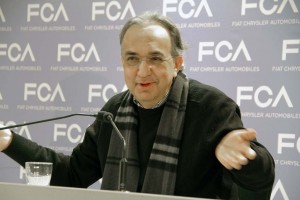Senior officials at Fiat Chrysler Automobiles are sending out signals that they’d like to find another partner, barely a year after the trans-Atlantic alliance was officially completed. Such a deal could be come together – if a willing partner can be found – before CEO Sergio Marchionne’s planned retirement in 2019, according to various sources.
Marchionne has made a number of comments in recent months underscoring his desire to address fundamental problems that could limit FCA’s ability to compete in an increasingly competitive global auto industry.
Now, FCA Chairman John Elkann has weighed in. While he didn’t specifically say his company was on the prowl, Elkann wrote shareholders at Exor, which owns 29.2% of FCA, “I’m convinced that the industry needs and will see more consolidation in the future.”
The former Fiat SpA stepped in during Chrysler’s 2009 bankruptcy, initially acquiring a 20% stake in the troubled U.S. automakers, then growing it through a series of steps that led to a complete takeover and merger of operations last year as the newly formed FCA.
The combined company sold 4.6 million vehicles in 2014, an increase of 4.6%, to position itself as the world’s seventh-largest automaker. As part of a plan outlined last May, Marchionne has set a goal of boosting that to 7 million by 2018 – which would still lag far behind industry leaders Toyota, Volkswagen and General Motors, all of which are looking to top sales of 10 million this year.
During a media roundtable at the Geneva Motor show last month, Marchionne underscored his interest in finding some sort of partner. He also suggested FCA would be open to a variety of alternatives that could range from a series of joint ventures to a more formal alliance, possibly even a merger. He suggested even a partnership with GM or Ford would be “technically feasible,” though both have ruled that option out.
With both of FCA’s top two executives talking about consolidation, industry observers have begun speculating about what options are available.
The small Japanese maker Mazda has come up because it worked with Fiat to develop the platform for a new sports car that will be sold as the next Mazda MX-5 Miata and as a Fiat model yet to be named.
“In the case of Mazda, they had something we didn’t have and we continue to look at opportunities like that going forward,” Marchionne said last month.
The CEO also suggested his company “obviously” would consider a non-traditional tie-up with the likes of a Google or Apple. The former tech giant has itself said it is looking for a carmaker that would like to put its autonomous vehicle technology into production. Apple, meanwhile, is said to be developing its own high-tech vehicle and may turn to an established automaker rather than trying to build its own carmaking operation.
Apple, the CEO noted, has about $753 billion in market capitalization – more than the entire top 10 list of conventional automakers – and tens of billions in cash it could use to fund an automotive venture.
(For more of what Marchionne had to say in Geneva, Click Here.)
A potential partner for FCA that many observers are focusing on is PSA Peugeot Citroen. The struggling French carmaker entered an abortive alliance with GM several years ago and is said to be looking for an alternative to help address its problems. Like Fiat Chrysler, Peugeot needs to become a more global player. And it has to fill in numerous gaps in its product line-up.
“PSA is in kind of the same predicament” as Fiat Chrysler, said George Petersen, a veteran analyst with consulting firm AutoPacific, Inc. “They may be in a mood to talk.”
The desire to get things done may be increasing as Marchionne approaches his planned retirement date in 2019, according to various observers. That could explain why the CEO and Elkann, an heir to the founders of Fiat, have been so open in discussing consolidation lately.
Marchionne, says Peterson, “is a pretty aggressive guy. If he’s really determined to do this I’d expect he can get it done before he retires.”
The Fiat CEO isn’t the only industry leader looking at consolidation. Carlos Ghosn, who helped put together the successful Renault-Nissan Alliance in 1999, has added a third leg to that partnership, a more limited series of ventures with Germany’s Daimler AG.
(Ghosn aims to turn Renault-Nissan into world’s third-largest automaker. Click Here for the story.)
But Daimler serves as an example of how global consolidation can go wrong. It pulled out of its own “merger of equals” with Chrysler after a decade of trouble. And GM’s quick exit from the Peugeot deal followed the U.S. maker’s decision to abandon a number of other international partnerships with such companies as Suzuki, Isuzu and Fuji Heavy Industries, the parent to Subaru.
In his letter to Exor shareholders, Fiat Chairman Elkann said his goal is “avoiding the all too typical divisive trappings of a takeover and creating instead a shared transnational culture. This is one of the most important lessons learned from combining Fiat and Chrysler to create FCA.”
(Marchionne defends Jeep safety in court. Click Here for the story.)


This is no surprise with Fiats Euro challenges and limited opportunity in the U.S. Marchionne must be looking for a super platinum parachute.